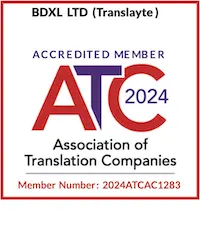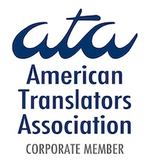Certifying Your Translation
Translayte provides certified, sworn, notarised and legalised translations that are accepted globally.
We explain some of the core differences below.
What is an Official Translation?
An official translation is the translation of a document, such as a birth certificate or academic transcript, with an accompanying certification or sworn statement from an authorised translator or agency.
Official translations are usually required if you're submitting a document issued in a foreign language to a government authority or organisation, as part of an application.
The term "official translation" is often used interchangeably with certified, sworn, notarised or legalised translations, but they are produced in slightly different ways.
Certified Translation
A certified translation is the translation of a document that is accompanied with a certification. The certification is usually in the form of a signature, stamp and a statement from the translator or a representative of the translation agency.
Certified translations are required by authorities and organisations in the UK, USA, Australia and Ireland and those produced by Translayte are completed on our letterhead, and accompanied by a Statement of Accuracy, our stamp, signature and contact details.
Sworn Translation
Sworn translations are certified translations that can only be provided by officially appointed translators in the country you are submitting your application. Sworn translators usually have to undertake exams, and are only approved to translate select languages.
Several countries globally (e.g. France, Spain, Italy, Netherlands, and Germany) require a sworn translator. In such cases, Translayte will work with an approved translator, who completes your translation, and appends their signature, stamp & contact details, making the translation acceptable within that country. Here are some of the countries that require sworn translations: France, Germany, Italy, Spain, Brazil, Bulgaria, Netherlands, Belgium, and Poland.
Notarized Translation
Notarized translations are certified translations that include a sworn statement from a Notary Public. A Notary Public appends their signature & stamp to the translation, confirming the identity of the translator and certifying their statement. A Notary cannot verify the authenticity of the translation, as they are usually not translators.
Notarized Translations produced by Translayte are first certified, then presented to a British Notary Public (if it is for the UK), who appends their signature & stamp to our company certification. Notarized translations may be required in Portugal, by UK Courts, Embassies, or Foreign Institutions. Other countries that require notarization include Canada, Portugal, Turkey, Lithuania.
Legalised Translations (Apostille)
Legalised translations are certified or sworn translations that have been "legalised" by a Government Ministry to make them admissible in any foreign country that is part of The Hague Convention. The legalisation process may involve getting an Apostille, which is then affixed to the translation. In addition to getting official translations for your documents, Translayte is also able to get apostilles from various countries for your official documents. All you have to do it select the apostille option at the point of your order.
Furthermore, Translayte produces legalised translations either by requesting one from a sworn translator, or by having our certified translation notarized, and then legalised by the relevant authority in the source country. Below, we share more information on how you can get apostilles or Consular legalisation for your documents from different countries:
How to Have my Documents Legalised and Translated in Slovakia | How To Get An Apostille On Documents Issued In The Netherlands | |
How to Have my Documents Legalised and Translated in Romania | ||
Why Should You Choose Translayte for Certified Document Translation?
At Translayte, we understand that accurate and efficient translation is crucial to your success. Our commitment to excellence, our experienced team of professional linguists, and our dedication to customer satisfaction sets us apart.
Expertise: Our team consists of highly skilled and experienced translators, editors, and proofreaders who specialise in a wide range of industries and languages. We guarantee precise translations that capture the nuances and subtleties of your original content.
Quality Assurance: We follow a rigorous, multi-step quality assurance process, including multiple rounds of proofreading and editing to ensure your translations are accurate, clear, and culturally appropriate.
Fast Turnaround: We understand the importance of meeting deadlines and are committed to delivering your translations on time, without compromising quality. We offer flexible turnaround times from a 12-hour delivery to suit your project needs and can accommodate urgent requests.
Confidentiality: We take data privacy and security seriously. All our team members are bound by strict non-disclosure agreements, and we implement the latest encryption technologies to protect your files and information.
Personalised Service: We value our clients and are dedicated to providing personalised attention to each project. Our responsive customer support team is available 24/7 to address your concerns and answer any questions you have.
How Translayte Works
Navigate to 'ORDER YOUR TRANSLATION' on the Translayte home page.
Select ‘Certified Translation’.
Select the source and target languages respectively.
Upload the document(s) you need to be translated.
Select the type of certification you require (if applicable).
If you want expedited services, select that option. Provide any extra instructions after this.
Click "PROCEED TO ORDER"
Make the payment securely online. Once your order is placed, our team will assign it to a suitable certified/sworn translator, and you'll receive the translated document within the specified timeframe.
By understanding the certified translation requirements in different countries and choosing a reliable service, you can ensure your legal documents are properly translated and recognised. Get in touch with us today and experience hassle-free certified translations!
















































